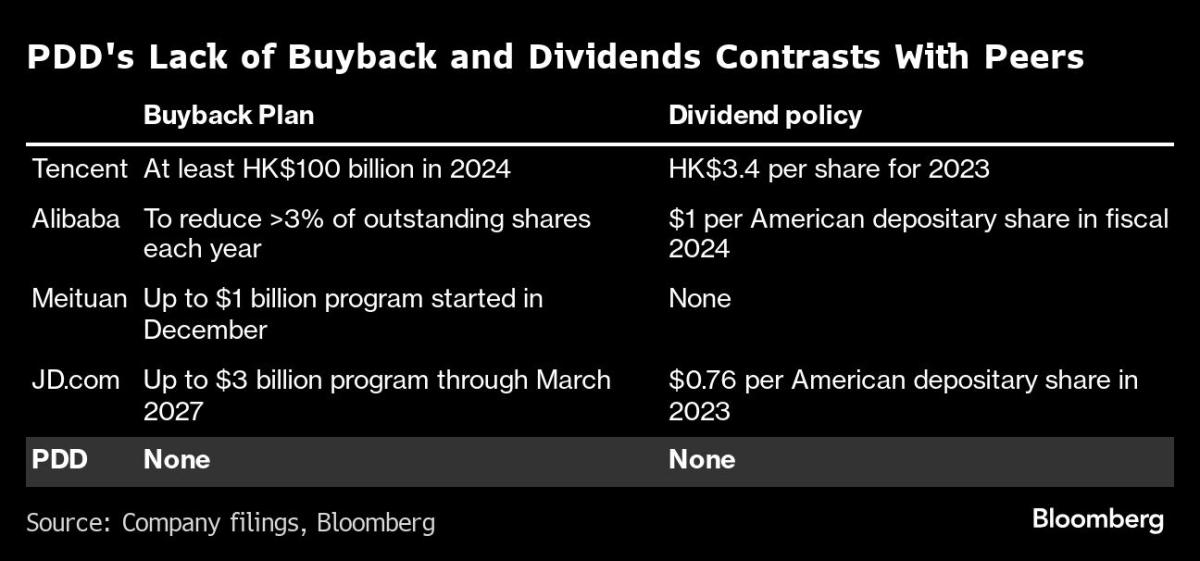(Bloomberg) — Shares of Temu parent PDD Holdings Inc. are held back by geopolitical risks and fierce competition in China’s e-commerce sector.
Most read from Bloomberg
Granted, the US-listed stock is up 43% from its March low, but still trades at just 13 times expected earnings for the coming year. That’s half the valuation of the Nasdaq 100, which is PDD’s deepest discount ever.
That might seem like a great bargain for a company that more than doubled revenue last quarter, a pace of growth second only to Nvidia Corp. on the technology-focused index comes in second. Some see the divide as justified given the harsh trade war rhetoric from Beijing and both candidates in the upcoming US presidential elections.
“People are concerned about election risks and possible tariffs for PDD, leading many to place no or even negative value on Temu,” said Shuyan Feng, deputy general manager for investment management at Huatai Asset Management (Hong Kong).
Read more: A new trade war offers no easy way back for the old global order
PDD’s profits more than tripled in the quarter ending in March as the company successfully pushed its budget e-commerce model to overseas markets. Temu’s high growth has drawn criticism from key Western markets, with European complaints that the Chinese online market is failing to protect consumers.
The problems run deeper in the US, where lawmakers allege Temu and rival Shein are exploiting loopholes to the detriment of US competitors. The US government’s recent order against ByteDance Ltd. to divest TikTok has further increased pressure on other Chinese internet companies.
Another source of concern is the intense rivalry within China. After years of ceding market share, PDD’s archrival Alibaba Group Holding Ltd. double-digit growth in gross trade value in the last quarter. Sales growth also accelerated at JD.com Inc., which has cut prices and increased perks to woo shoppers.
Not that investors have avoided PDD; the 43% gain since March is ten times the advance in the Nasdaq 100. But that is far exceeded by the nearly 60% increase in forward earnings expectations in the same time frame.
Goldman Sachs Group Inc. on Friday upgraded PDD to Buy from Neutral, citing the company’s strong revenue growth and adtech capabilities. The main negative factors of intense domestic competition and tensions with the US are “more than priced in,” according to analyst Ronald Keung.
“Chinese e-commerce is emerging as one of the more undervalued subsectors within the Chinese internet,” Keung wrote in a note. “We note that there still appears to be limited appetite among investors to appreciate Temu’s full business potential given geopolitical uncertainties.”
A further reason for PDD’s valuation discount could be its lack of shareholder return initiatives, while companies like Alibaba and Tencent Holdings Ltd. buy back billions of dollars worth of stock. With the exception of PDD, all top 15 members of the exchange-traded Kraneshares CSI China Internet Fund have a buyback program or a regular dividend distribution policy.
Another thing that could hold PDD back is the unclear information for investors. PDD does not report revenue by region, and business segments can be difficult to analyze.
“The main thing holding back PDD’s valuation is the lack of disclosures,” said Xin-Yao Ng, investment director at Abrdn. “It is very difficult to value domestic PDD and Temu separately, and that is important because there is certainly a large geopolitical discount to the shares due to Temu.”
Top tech stories
-
Equity investors are scouring Southeast Asia for alternatives to play the artificial intelligence theme as tech giants are set to spend billions of dollars on infrastructure spending in the coming years.
-
Asia’s richest man, Mukesh Ambani, is about to enter Africa with a telecoms venture in search of mobile broadband customers in a fast-growing market.
-
Bets for more Ether profits are mounting after a surprise twist in U.S. regulations to allow exchange-traded funds for the digital assets, even as questions arise about the strength of demand for the products.
Most read from Bloomberg Businessweek
©2024 BloombergLP
